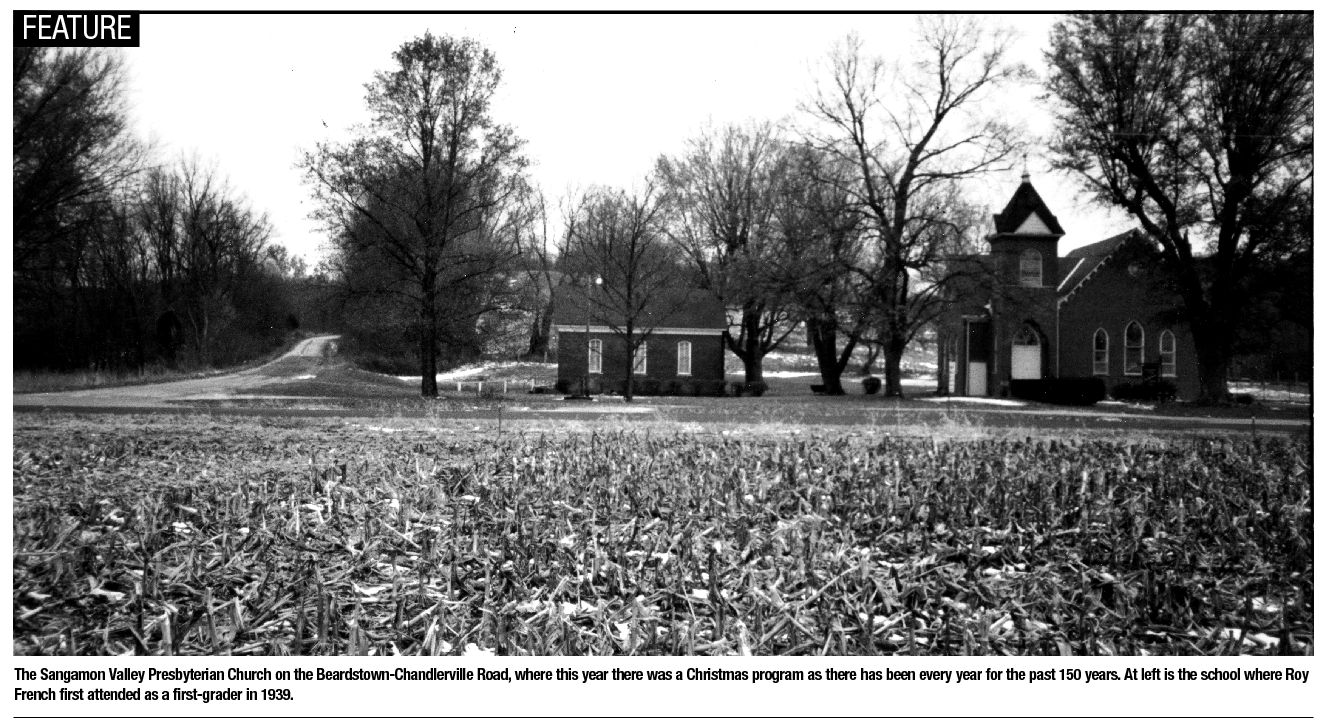
The church is a blessing
A Christmas memoir
HICKORY JOURNAL | Roy L. French
Mr. Houck came early to the Sangamon Valley while it was still a wilderness without many inhabitants. He came before the land was surveyed so his fields stretched from the big sycamore tree to the east, to the large cottonwood on the creek bank to the west. All the land in between and up to the foothills to the south was his.
With a team of oxen he plowed under the marshy wild onion plants and the willow sprouts. He planted it in corn and the corn did abundantly well.
He watched the spring rains come, and the Sangamon River overflowed its banks and covered his fields.
Mr. Houck was a patient man. He watched the water recede and after the floodwaters were gone he noticed a thick layer of mud covering his fields. It was the richest mud he had ever seen. It was good topsoil from the river bottom land. When the season was right he plowed it under and grew the best crop of corn and wheat in the whole river valley. Instead of the flood being a detriment it was a boon to him.
Mr. Houck prospered and bought land to the east toward the rising sun. He bought hill ground to the south that was good pasture for his horses, cattle and hogs. It was good for his sheep too.
There were freshwater springs that fed into creeks that flowed from the hollows and provided ample water for the livestock.
The community was growing. There was now a school and a church, both of them fine brick structures. They had a manse for the preacher to live in. It wasn’t long before a blacksmith opened a shop, and they had a name. It was Hickory Precinct.
By now Mr. Houck had neighbors, good neighbors all around. He had a wife and children. He tended to his farming, to his livestock. The rains came. The sun shone and life was good.
Toward the end of the year when all the crops were harvested and put away, when the cattle and sheep were all fattened for winter, Mr. Houck had time to think about all his good fortune. He was a thoughtful man.
Toward Christmastime on a Sunday afternoon, he put on his suit, overcoat and bowler hat, hitched up his favorite driving mare to his Sunday rig, and trotted off down the road. He passed his neighbors. He went a mile or so past the church and school, then turned north and continued till he came to a lane that led him back to Elder Schaad’s place.
Mr. Schaad welcomed him. They had much to talk about farming in the Sangamon Valley. After awhile Mr. Houck reached to an inner pocket and brought out a check. “Spend it any way you want, just so long as it’s for the good of the church.” Mr. Schaad cordially thanked him and they shook hands. With that, he took his leave and his horse and rig disappeared up the lane.
This went on for several years as regularly as clockwork. Then one December day close to Christmas, Mr. Schaad could see Mr. Houck coming down the lane. Mr. Schaad’s curiosity got the best of him. He was perplexed because none of the Houcks attended the church. Mrs. Houck was not a member of the Missionary Society. Their children did not attend the Sunday school. Mr. Schaad had to ask. “Thank you very much, Mr. Houck, for the check, but what is the reason for your generosity with the church?” In a moment Mr. Houck thoughtfully began to speak. “Well, you see, it’s like this, Mr. Schaad. I feel this valley is a better place for having the influence of the church here. The members of this church are my good neighbors, and I cannot ignore their benevolent presence.
“Each morning as I wake, I look over this bottomland from my upstairs window. I can see their farms, can see most of their homes, see many already out in their fields and I am thankful for this place where I live. The value of my life, and the value of this land I tend are greater for having your church nearby. I feel it’s a blessing.
“So you see, Mr. Schaad, when I explain my giving to the church as I have, I feel my contribution doesn’t quite balance with the goodness I receive. But do with it what you will till I can make it more.”
They shook hands, a thankful handshake.
Mr. Houck climbed into his rig and with a “giddyup” disappeared up the lane. Mr. Schaad watched him till he was out of sight. “Merry Christmas, Mr. Houck,” he said in a whisper. “Merry Christmas to you.”
Roy L. French is proprietor of The Caraway Seed shop, on the courthouse square in Virginia, Ill. He is 77 years old and has written a Christmas memoir for Illinois Times every year for about 30 years. Publish America has agreed to publish a collection of his stories, many of which have appeared in Illinois Times, in 2011.